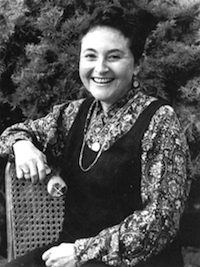It’s Easier Than You Think: The Buddhist Way to Happiness
Sylvia Boorstein
HarperSanFrancisco: 1995.
145 pp., $17.00 (cloth).

Sooner or later, certain spiritual truths spell themselves out in the material of our ordinary lives. Anyone who has faced loss or struggled against change—in short, all of us—can tell a story illustrating the Second Noble Truth: attachment causes suffering. The trick is discovering the Third Noble Truth: the possibility of liberation, even in the midst of all our compelling pains and hopes and seductions. For most of us, this is where the Buddha’s path begins.
In It’s Easier Than You Think: The Buddhist Way to Happiness, Sylvia Boorstein, a California-based teacher of Vipassana meditation, weaves together teachings from the sayings and experiences of non-Buddhists, seeking to demonstrate that Buddhist practice and meditation is ultimately based on reality and “does not need to be a big deal.” In addition to offering a good practical introduction to Buddhism for Western readers, Boorstein’s stories provide fresh evidence of the good-news aspect of Buddha’s message—that we all have the potential to be enlightened, that we have a built-in capacity to experience the truth directly and to be transformed. Nevertheless, I wonder if Boorstein’s warm-hearted insistence on how ordinary and non-sectarian waking up is might not obscure how extraordinary it is as well. As close to ordinary life as moments of “seeing clearly” are, they are still miraculous from our ordinary point of view.
Boorstein was drawn to the practice of insight meditation in the mid-70’s because her life was, in a sense, too good to be true—too full of beloved attachments that could easily break her heart if they were severed. She was filled with vague anxiety over the precariousness of life. “I was so relieved to meet people who were willing to say that life is difficult, often painful, and who still looked fine about admitting it,” writes Boorstein of her fellow meditators. “Most important, they looked happy. That was tremendously reassuring to me.”
After two decades of practice, Boorstein herself has become such a reassuring figure that she is referred to by her students as the “Jewish grandmother bodhisattva.” And that description fits the tone of the book, which is cozy and close-to-home. In describing how to apply the First Noble Truth—“that in life pain is inevitable but suffering is optional”—she tells us how her neighbor Mr. Corey sat relaxed and unmoving by crates of tomatoes and zucchini, just waiting in case somebody came by to buy produce. “Mr. Corey didn’t have anything he needed to do, so he wasn’t doing anything,” she writes. “I never discussed philosophy with Mr. Corey, but my guess is he would say, ‘If it isn’t broken, don’t fix it,’ and ‘If it is broken, and you can’t fix it, don’t worry about it.’” Boorstein even has the chutzpah to fix the Buddha a little by adding the practical “Third-and-a-Half Noble Truth,” that suffering is manageable. So you’re not Buddha, she reassures us. Give yourself some credit for “managing gracefully.”
Still, I wondered if the author and her friends and relations might not be a bit too healthy to relate to the sufferings of many contemporary readers. After all, Boorstein confesses that, while she has brief attacks of what’s-it-all-about cosmic doubt, she has never personally experienced the slippery torment of self-doubt and, moreover, has enjoyed high self-esteem since childhood. I am curious about how Boorstein, a psychotherapist by profession, views the more persistent hindrances to happiness, those patterns of suffering that people unconsciously play out over and over because they haven’t seen clear through to the source of their pain. Even sane, sincere people are driven by unhealed wounds. I wanted more wise stories about working with one of the most powerful and profoundly practical ideas in Buddhism—that the act of clear seeing itself can transform painful experience into liberation.
Nonetheless, Boorstein’s is a delightful, useful book and her own path from Brooklyn to Jewish grandma bodhisattva can remind us that waking up is down-to-earth and transforming, both at once.
Thank you for subscribing to Tricycle! As a nonprofit, we depend on readers like you to keep Buddhist teachings and practices widely available.